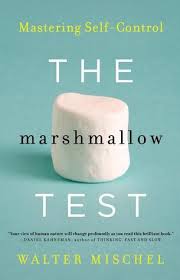 Walter Mischel is a benefactor of humankind. By that I mean more than just giving marshmallows and Oreos to appreciative preschoolers. His decades of research into self-control have had an immeasurable impact on the developing field of positive psychology. The “marshmallow test” in particular is cited constantly in books, articles, and various TV shows; he’s even influenced Cookie Monster on Sesame Street. I was pleasantly surprised to learn that the “marshmallow test” is only the beginning, and that as much as I had heard about this groundbreaking experiment, it was really only an appetizer. It’s a terrific, funny, and thought-provoking book. Marshmallows are revolting, as I’m sure everyone agrees, and I always thought, “Oh, I could resist a marshmallow all day and all night.” I have a lot of grit and I’m extremely stubborn. If there was a prize or cash on the line I’d still be there four days later, just to make sure I held the record in perseverance. I’d love to tell myself that I have total self-control. As a middle-aged person, I know better. Where we cave and allow ourselves complete leeway varies by individual temptation. I don’t give a care about food “treats” but I am almost completely powerless against books. I tried not reading books for a month and it was so depressing and awful that I’d never do it again. I also have a terrible time admitting that my news queue or to-be-read stack is past capacity. What would I have to recast in my identity to feel less hot temptation around the printed page? The introduction to The Marshmallow Test cites Adam and Eve in the Bible. Lack of self-control is our original sin. It seems that developing control of our emotions and impulses may be what separates us from other primates. I often wonder what chimps could do if they weren’t constantly distracted by interpersonal drama, and that of course raises the question whether humans hamper our achievements in the same way. A fascinating point that Mischel cites is Carol Dweck’s research around willpower. Not everyone’s self-control is diminished after a so-called depleting experience. It depends on whether the person believes that certain types of experience deplete energy or willpower. This clicks and feels highly relevant to me. On a daily basis, I hear people saying they wish they had more willpower or motivation or that they can’t deprive themselves. It’s a story people latch on to that helps them bond with others who feel the same way. I think it’s also a self-fulfilling prophecy. We have to believe that the rewards of waiting and deferred gratification are better than the rewards of immediacy. Most of us probably aren’t convinced. There is a mathematical formula in Chapter 19 that explains why procrastination feels like a rational act. I won’t spoil it, but it was a jaw-dropper for me. It helps to address Dr. Tim Pychyl’s point about why a rational person would behave irrationally by choosing something as the most important and valuable course of action, and then deliberately avoid doing that thing. Behavioral economics is rapidly assembling a body of research that explains this pretty clearly. The Marshmallow Test is an excellent book that was worth the wait. It explores the current research around self-control. It goes beyond this to practical applications for everyday life. Don’t deprive yourself; read it right away. Comments are closed.
|
AuthorI've been working with chronic disorganization, squalor, and hoarding for over 20 years. I'm also a marathon runner who was diagnosed with fibromyalgia and thyroid disease 17 years ago. This website uses marketing and tracking technologies. Opting out of this will opt you out of all cookies, except for those needed to run the website. Note that some products may not work as well without tracking cookies. Opt Out of CookiesArchives
January 2022
Categories
All
|
 RSS Feed
RSS Feed